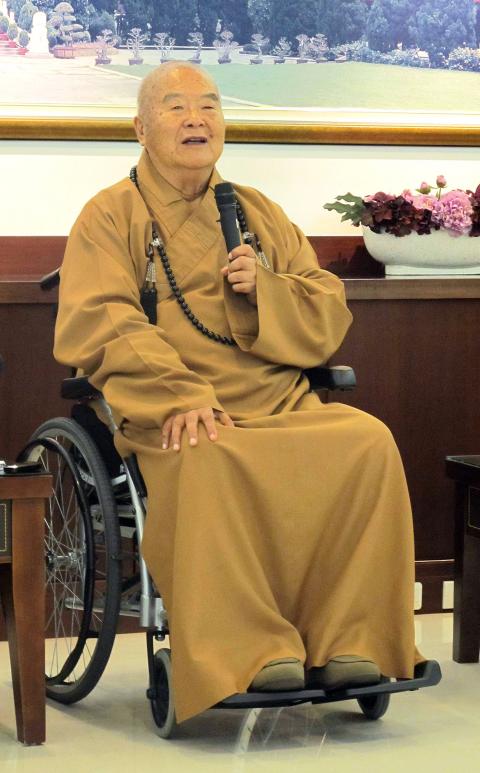Democratic Progressive Party interim chairperson Chen Chu (陳菊) yesterday expressed appreciation for Buddhist Master Hsing Yun’s (星雲法師) call to have former president Chen Shui-bian’s (陳水扁) prison term changed to house arrest.
In an article published by the Fo Guang Shan Monastery on Monday, the founder of the monastery said Chen Shui-bian was thrown behind bars because he could not resist the “human temptation of greed.” Still, Hsing Yun said he would urge President Ma Ying-jeou (馬英九) to give the former president “special treatment.”
Chen Shui-bian is serving a combined 17-and-a-half-year jail term after being convicted of corruption. Recently, he has requested visits to a hospital because of poor health.

Photo: CNA
The Republic of China is badly in need of unity at home and peace across the Taiwan Strait, and getting Chen Shui-bian out of jail and moving him to a private house where he could spend the rest of his life with his family would go a long way toward realizing that goal, Hsing Yun said.
Expressing gratitude to -Hsing Yun for his concern for the former president, Chen Chu yesterday said she hoped Ma could demonstrate leniency and respect, and provide for the former president’s basic humanitarian needs.
Saying Chen Shui-bian’s health is of high concern to the public, Chen Chu called on the government to swiftly release him for medical treatment.
In the same article on Monday, Hsing Yun also urged Ma to grant Justin Lin (林毅夫), who defected to China years ago and is now a vice president of the World Bank, a pardon and allow him to visit his family in Taiwan.
Lin’s defection to China in 1979 was a heinous crime back then, but cross-strait ties have changed so much that it is time to relinquish hostility and shelve controversy in pursuit of peace and friendly ties, Hsing Yun said.
Commenting on the matter, the Ministry of National Defense yesterday reiterated its stance that Lin is still a wanted criminal on charges of desertion and “if he returns [to Taiwan], he will be dealt with in accordance with the law.”
The government has never stopped Lin from setting foot in Taiwan, ministry spokesman Major General David Lo (羅紹和) said, but he stressed that it was important to deal with Lin’s defection based on the law.
Article 24 of the Criminal Code of the Armed Forces stipulates that “a person who surrenders to an enemy will be sentenced to death, imprisoned for life or imprisoned for not less than 10 years.”
Meanwhile, the Presidential Office said the president “is not currently considering” granting an amnesty to Chen Shui-bian and if Lin ever returned to Taiwan, he would be “handled in accordance with law.”

Three batches of banana sauce imported from the Philippines were intercepted at the border after they were found to contain the banned industrial dye Orange G, the Food and Drug Administration (FDA) said yesterday. From today through Sept. 2 next year, all seasoning sauces from the Philippines are to be subject to the FDA’s strictest border inspection, meaning 100 percent testing for illegal dyes before entry is allowed, it said in a statement. Orange G is an industrial coloring agent that is not permitted for food use in Taiwan or internationally, said Cheng Wei-chih (鄭維智), head of the FDA’s Northern Center for

LOOKING NORTH: The base would enhance the military’s awareness of activities in the Bashi Channel, which China Coast Guard ships have been frequenting, an expert said The Philippine Navy on Thursday last week inaugurated a forward operating base in the country’s northern most province of Batanes, which at 185km from Taiwan would be strategically important in a military conflict in the Taiwan Strait. The Philippine Daily Inquirer quoted Northern Luzon Command Commander Lieutenant General Fernyl Buca as saying that the base in Mahatao would bolster the country’s northern defenses and response capabilities. The base is also a response to the “irregular presence this month of armed” of China Coast Guard vessels frequenting the Bashi Channel in the Luzon Strait just south of Taiwan, the paper reported, citing a

The Chinese military has built landing bridge ships designed to expand its amphibious options for a potential assault on Taiwan, but their combat effectiveness is limited due to their high vulnerability, a defense expert said in an analysis published on Monday. Shen Ming-shih (沈明室), a research fellow at the Institute for National Defense and Security Research, said that the deployment of such vessels as part of the Chinese People’s Liberation Army (PLA) Navy’s East Sea Fleet signals a strong focus on Taiwan. However, the ships are highly vulnerable to precision strikes, which means they could be destroyed before they achieve their intended

UNDER PRESSURE: The report cited numerous events that have happened this year to show increased coercion from China, such as military drills and legal threats The Chinese Communist Party (CCP) aims to reinforce its “one China” principle and the idea that Taiwan belongs to the People’s Republic of China by hosting celebratory events this year for the 80th anniversary of the end of World War II, the “retrocession” of Taiwan and the establishment of the UN, the Mainland Affairs Council (MAC) said in its latest report to the Legislative Yuan. Taking advantage of the significant anniversaries, Chinese officials are attempting to assert China’s sovereignty over Taiwan through interviews with international news media and cross-strait exchange events, the report said. Beijing intends to reinforce its “one China” principle